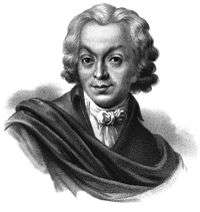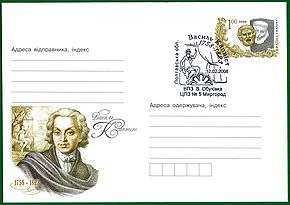Vasily Kapnist

Count Vasily Vasilievich Kapnist (Russian: Василий Васильевич Капнист, Ukrainian: Василь Васильович Капніст), (23 February 1758 – 9 November 1823), was a Russian poet and playwright of Ukrainian Cossack origin.
Kapnist's grandfather was a Venetian merchant of Greek origin from the island of Zakynthos. He was a descendant of the Venetian noble family of Capnissi (whose name derives from the Zakynthos surname Καπνίσης[1]), he spent all his life in the manor of Obukhovka near Poltava. Vasily's maternal ancestors were Ukrainian Cossack starshyna. His lifelong friendship with Nikolay Lvov and Gavrila Derzhavin date from the early 1770s, when all three served in the Leub Guard. Derzhavin later married Kapnist's sister-in-law and visited the poet and his wife in Obukhovka more than once.
The extension of Russian serfdom to the Ukrainian lands dismayed Kapnist and occasioned his two most notable poems, Ode on Slavery (1783) and Ode on the Elimination of Slavery in Russia (1786), in which he chastised serfdom as the principal pest of contemporary Russian society. His later poems belong to the Horatian tradition, anticipating Russian Romanticism in their social pessimism and admiration of simple family joys.
Kapnist revealed himself as a savage satirist in his most famous work, a satirical verse drama based on the poet's litigation against a neighbour and aptly entitled Chicane (1798). His victims are the judges and officers of law, whom he paints as an unredeemed lot of thieves and extortioners. The play is in rather harsh Alexandrines but produces a powerful effect by the force of its passionate sarcasm. The poem is based on the Russian custom of state-appointed judges, whereas in Ukraine the judges were previously elected. The poem caused the Czar's extreme displeasure, and he ordered Kapnist "to be erased from memory", causing total ban on any of his literary efforts.

Although Kapnist dedicated his play to Emperor Paul, it was denounced by the censorship as scurrilous and libertarian. Banned after only four performances, it was not revived in St. Petersburg until 1805. According to D.S. Mirsky, "the two greatest Russian comedies of the 19th century, Griboyedov's Woe from Wit and Gogol's Inspector General, owe not a little to the crude and primitive comedy of Kapnist".[2]
Political activism
Kapnist was a proponent of the restoration of Ukrainian autonomy in the Russian Empire after Hetmanate was abolished by Catherine II. In 1788, he wrote a petition proposing the empress to restore the cossack host in Ukrainian lands and use its soldiers in the ongoing war against Turkey. However, when the military situation improved, the imperial government refused to implement this plan.[3] In April 1791, either Kapnist or one of his brothers had a secret meeting with Prussian chancellor Ewald Friedrich Graf von Hertzberg, trying to persuade the Prussian government to declare war on Russia in case an uprising starts against Russian rule in Ukraine. However, this mission was unsuccessful as king Friedrich Wilhelm II refused to give his own consent for such an action.[4]
References
- ↑ B.O. Unbegaun, Russkie familii (Moscow: Univers, 1995), p. 275.
- ↑ D.S. Mirsky. A History of Russian Literature. Northwestern University Press, 1999. ISBN 0-8101-1679-0. Page 56.
- ↑ Zenon Kohut. Roots of Identity. Studies on Early Modern and Modern Ukraine. Krytyka, Kyiv, 2004. Page 71-72.
- ↑ Zenon Kohut. Roots of Identity. Studies on Early Modern and Modern Ukraine. Krytyka, Kyiv, 2004. Page 67.
External links
- (Russian) Biography of Kapnist
- (Russian) Kapnist. Poems
- English translations of 4 epigrams